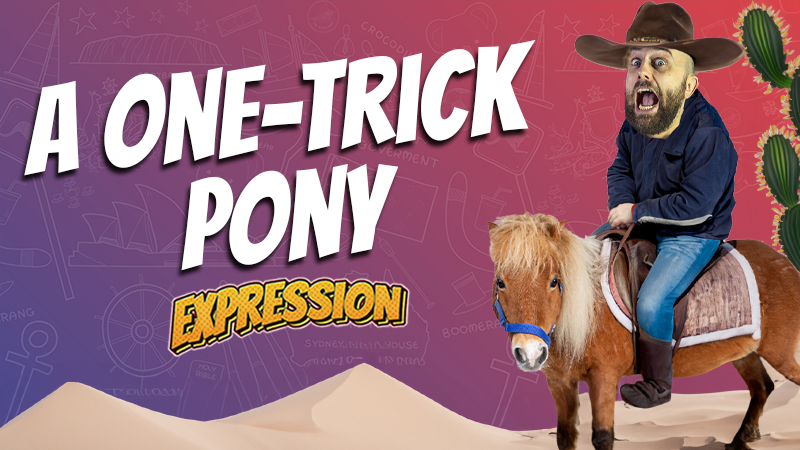AE 354 – Expression: Six Of One, Half A Dozen Of The Other
In this expression episode of Aussie English you’re going to learn how to use SIX OF ONE, HALF A DOZEN OF THE OTHER like a native.
Download the PDF + MP3
AE 354 – Expression:
Six Of One, Half A Dozen Of The Other
Alright. So, welcome to today’s episode, guys. This is The Aussie English Podcast, the number one podcast for those interested in learning Australian English, learning to understand Australian English, the accent. I know it’s a bit tricky sometimes. And also, wanting to speak like an Australian when you learn English. So, that’s what this podcast is all about. That’s what my YouTube channel and Facebook is all about. It’s empowering you guys, helping you guys to overcome the annoying language of Australian English.
So, today’s expression is going to be “six of one half, a dozen of the other”, “six of one, half a dozen of the other”. This one comes from Petinka. Thank you Petinka. She suggested this in The Aussie English Virtual Classroom group on Facebook, which you can all join. Every week on Tuesday, I put a post up asking for suggestions for the expression episodes. Petinka was the one who suggested this week’s one. And then you guys get to vote on which one is your favourite. And this is the one that got to the top.
As usual guys, before we get into that let’s go through a little joke first, an Australian joke. OK.
Aussie Joke:
So, why do kangaroos hate rainy days? Why did kangaroos hate rainy days when it rains, when it buckets down, when it’s raining cats and dogs? Why would kangaroos hate rainy days? Because their children play inside. Do you get it? Why the kangaroos hate rainy days? Because their children play inside. Hopefully, you get that one.
So, obviously, they live in the pouches, and if it’s raining the kangaroos are stuck in the pouch just playing inside, which is something that would probably annoy most, I guess, humans when it’s raining and they can’t put their kids outside. So, there you go. The joke for today: why the Kangaroos hate rainy days? Because their children always play inside.
Expression Breakdown:
So, as usual, we’ll go through the different words in this expression, guys, “six of one, half a dozen of the other.”
So, “six”. I’m sure you guys know what “six” is. The number six. One, two, three, four, five, six.
“Half”. 50% or one of two equal portions of something. So, if I cut a cake down the middle, there’s two halves. I have half the cake on one side, half on the other. That’s half.
“A dozen” is a group or set of twelve things. So, most commonly I think you’ll buy a dozen eggs, or you might go to the bakery and get half a dozen hot cross buns during Easter in, I guess that’s, March/April in Australia. That’s something I love to do. I always go to get half a dozen hot cross buns in Easter. So, “half a dozen” is six, obviously. A dozen is twelve.
And then the last word here that you guys may or may not know is “other”, and this is used to refer to something that is different or distinct from something that has already been mentioned or is known about. OK? So, if something is the other, it’s the distinct or different or separate things, something else, “other.
Expression Definition:
So, “six of one, half a dozen of the other”. Let’s define the expression. The expression “six of one half, a dozen of the other” effectively just means same difference. So, it’s usually used when there’s two alternatives, you’ve got two options, and it doesn’t matter which one you pick, because they’re either the same or you just don’t care. So, as in, it’s like, it’s the same to you. So, they could be exactly the same thing as in you’ve got six here and half a dozen here, which is also six. Or it could be that you have two things and you don’t care which one you pick or which one you get. And so, you can say, “It’s six of one half a dozen of the other.” So, there’s no difference. OK. It’s all the same to me. I don’t mind. I don’t care. Either’s fine. Whatever. Six of one, half a dozen of the other.
So, as usual, let’s go through some examples, guys, of how we would use this expression.
Examples:
1.
So, example number one. Imagine that you go into a mate’s party. You’re going over to his house or you’re going around to his house for a party. And you’ve got to get an Uber there. You get in that bar and the guy says, “There’s two different ways to go over to your mate’s place or go around to mate’s place, which one did you want to take?”. And I might ask him, “Well, what’s the difference?”. And he says, “Well, they’re both going to take the same amount of time. They’re the same distance.”. So, I could say, “I don’t really care. It’s six of one or half a dozen of the other. So, they’re both exactly the same. They are going to give me the same result. So, I don’t really care which one you pick. Six of one, half a dozen of the other. You choose. Flip a coin. 50/50.” So, six of one, half a dozen of the other.
2.
Number two. So, imagine that you’re going to get takeaway food for the evening and your wife says, “Did you want to get Chinese food or did you want to get fish and chips? Chinese food or fish and chips?”. If you honestly don’t care, as in, you don’t mind, you know, it doesn’t bother you which one she picks, you’re just hungry. You could literally say, “It’s six of one, half a dozen of the other. I don’t mind. Same difference. Whatever you feel like. It’s all good. You pick. That’s the same to me.”. Six of one half, a dozen of the other.
3.
The last example here is probably where this sort of expression originates from. Imagine you’re going to buy some eggs and the guy at the “egg store”, wherever it is you’re buying eggs. The supermarket or the market. You’ve got to buy eggs from a store where they’re being sold. And imagine he has half a dozen over here and half a dozen over here, and they’re different brands, but they’re almost exactly the same, effectively. (The) same number of eggs, obviously. If he says, “Which would you like?”. And I look at them and say, “Well, it’s six of one and it’s half a dozen of the other.”, as in it’s exactly the same thing. I don’t care. Whatever. There’s six and one is six and the other one here. Six of one, half a dozen of the other. It’s the same to me. I’m fine with either one.
OK? So, hopefully you guys understand the expression “six of one, half a dozen of the other”. It’s just it’s the same difference. You’ve got two options, but they’re equal or you don’t care which one you choose. It’s six of one, half a dozen of the other.
So, let’s go through a little listen and repeat exercise here, guys, where you guys can practice your pronunciation. I’m always really passionate about helping you guys improve your pronunciation, and I feel one of the best ways to do this is to practice when you’re on your own. You don’t just have to practice English when you’re around other speakers of English, whether they’re native or they’re foreigners who have learnt English as a second language. It’s good, but it’s also really good to practice on your own. OK? Practice makes perfect.
So, let’s go through a quick listen and repeat exercise. If you guys want to speak out loud, maybe find somewhere quiet, somewhere away from other people. And let’s go through this exercise. OK.
So, I’m going to break up the phrase “six of one half, a dozen of the other”, and then at the end I’ll put it all together.
I want you to pay attention to how I pronounce the word “of”. OK? O-F. “Of”. We’ll talk about it a little bit after the exercise, but pay attention to how I pronounce of. OK? Let’s go.
Listen & Repeat:
Six of one x 4.
Half a dozen x 4
Of the other x 4.
Alright. Let’s do the full phrase.
Six of one half a dozen of the other x 5
Awesome job guys. So, the reason that I wanted you to pay attention to how I pronounce “of” is because I convert of into a schwa (/ə/) kind of sound. It just turns into a little vowel there when the word “of” is followed by another word that starts with a consonant sound. So, even though the word of “one” begins with a zero, an O*, it starts with a consonant sound “Weh”, “one”. So, I say, “O- one”, instead of one. So, that’s what happens when I speak quickly like a native. “Six_o-_one”, instead of “Six of one”.
The same thing happens with “half a dozen o- the other”, “half a dozen o- the other”. It really gets swallowed. It disappears in there. And because “the” starts with a consonant sound, “th-“, “the” I just say “o-“, “o- the other”. “Half a dozen o- the other”.
So, remember guys, if you want to practice that specific technique make sure you sign up to The Aussie English Classroom. There’ll be a link attached to this after the episode’s finished, or below if you’re watching this on YouTube or listening to the podcast. It’s a dollar to try for a month. But you’ll get all these kinds of exercises to really take your pronunciation to the next level and get you approaching native like pronunciation. That’s what I’m really passionate about, and it’s my mission to help you guys speak as much like me as possible.
So, before we finish, guys, let’s give you an interesting fact about Australia. Make sure you go and tell someone this awesome fact after you listen to this episode.
Aussie Fact:
So, despite Australia having a landmass, a landmass about the same size as Europe, its population is actually 30 times smaller than Europe, or the population of Europe. So, Australia’s population is only 24 million people. It’s a little above 24 million people. There are cities in the world bigger than that. Beijing, for one. However, in Europe they are 743 million people. So, it’s getting close to three quarters of a billion people. So, despite Australia having a huge landmass, it’s only one thirtieth the size of Europe with regards to population.
So, I hope you enjoy this episode, guys. Make sure you sign up to give The Aussie English Classroom a go. To give all the exercises, the bonus content, a go. You’ll get a full transcript with vocab, listening comprehension questions, phrasal verb exercises, pronunciation, Aussie slang exercises, and a grammar exercise at the end. You get bonus as MP3s, 3 of them, in order to practice this stuff. And it’s really designed to take your English to the next level. OK? So, if you like studying, if you like working hard, sign up and give it a go. It’s just one dollar for the first month. OK?
So, with that guys, I hope you have a frickin amazing weekend and I will see you next week.
Download the PDF + MP3
Here's what you get when you sign up!
- Read while you listen using the Premium Podcast player.
- Understand every word in every episode.
- Download all PDF transcripts and MP3s for 600+ episodes.
- Get access to bonus member-only episodes.













Responses